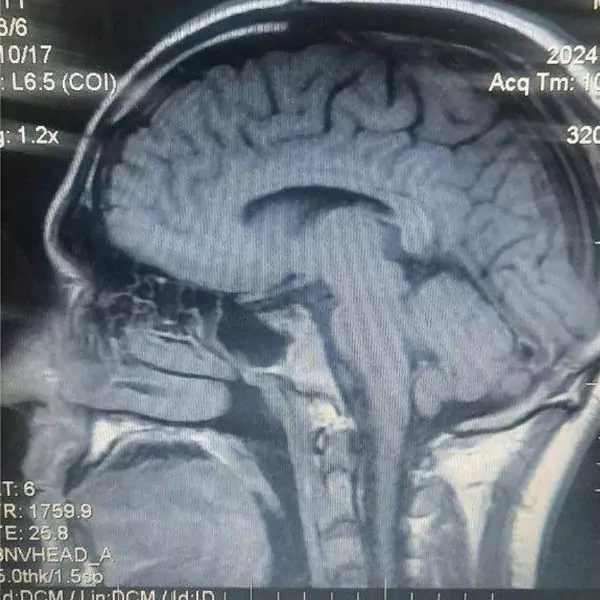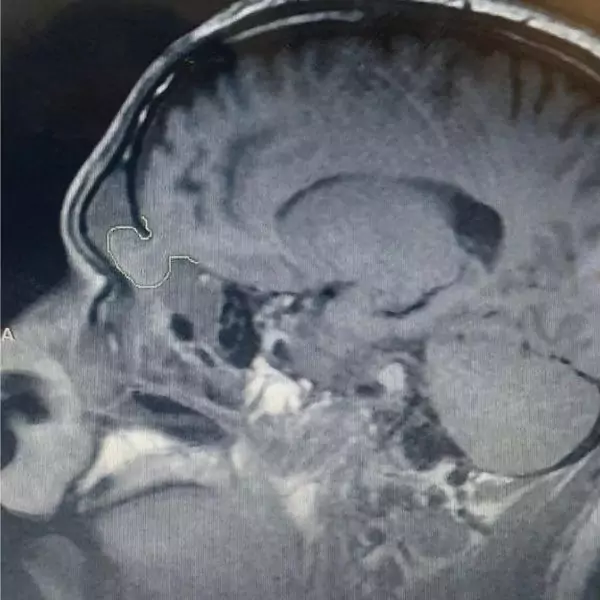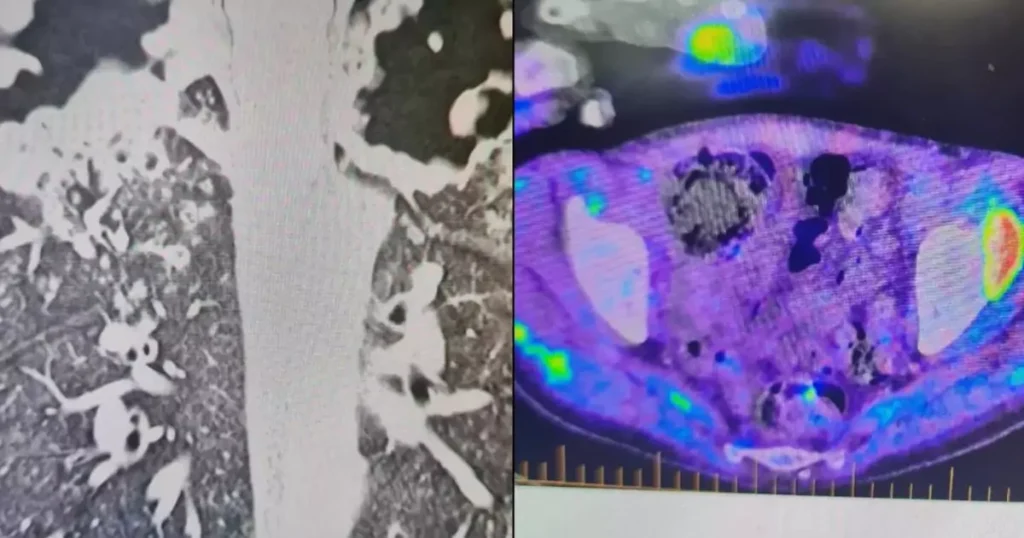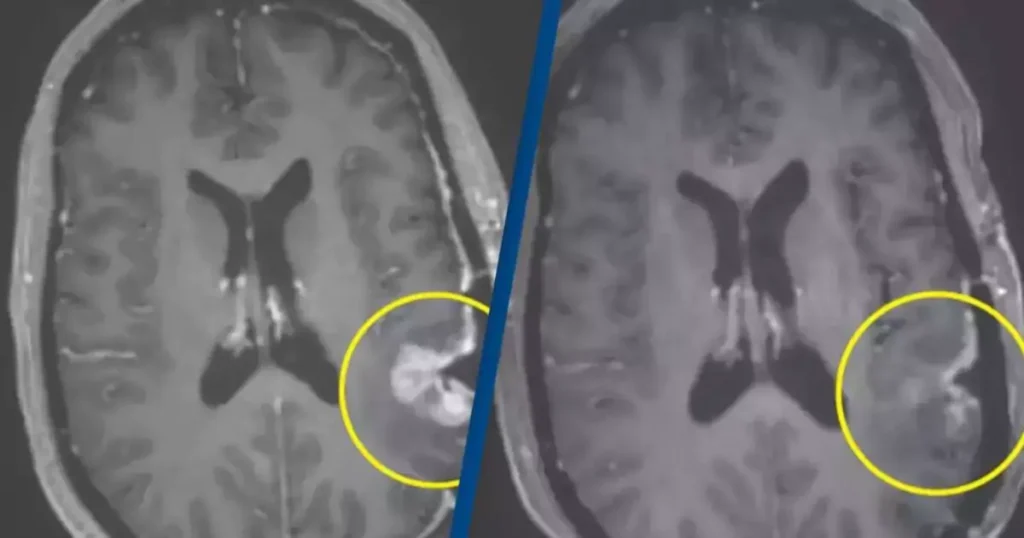
We’ve all dealt with a runny nose at some point, usually brushing it off as a mild annoyance due to allergies or a cold. However, a startling medical case published in the Journal of Medical Case Reports has revealed the story of a man who discovered his persistent runny nose was caused by something far more dangerous—cerebrospinal fluid leaking from his brain.
A Runny Nose That Wasn’t What It Seemed
In a case that left many horrified, a 20-year-old man from Syria experienced what seemed like an endless runny nose, accompanied by headaches and even seizures. His symptoms persisted for six years after a car accident caused trauma to his head. During all this time, the man assumed his runny nose was due to typical sinus issues, never suspecting it was a cerebrospinal fluid (CSF) leak—a condition known as encephalocele.
When the man finally sought medical help, doctors performed scans and uncovered the truth: his brain fluid was leaking through his nostril, a direct result of the head trauma he had suffered years earlier. The scans revealed a skull base fracture, through which portions of his brain tissue and meninges (the membranes that protect the brain and spinal cord) had herniated into the nasal cavity.
What Is Encephalocele? Understanding the Condition
Encephalocele is a rare condition in which brain tissue protrudes through a gap or hole in the skull. This is typically a congenital defect, meaning it happens during fetal development when the skull doesn’t form properly. However, in this man’s case, the condition developed due to trauma from the car accident. His head injury left a fracture in the skull, allowing brain tissue and fluid to leak through his right nostril.

The cerebrospinal fluid, which cushions the brain and spine, is crucial for protecting the nervous system. A leak like this can lead to serious complications, including infections like meningitis (inflammation of the brain and spinal cord membranes) and encephalitis (inflammation of the brain itself). This condition explains why the man not only experienced a runny nose but also endured frequent headaches and seizures over the years.
Symptoms and Warning Signs of a Cerebrospinal Fluid Leak
Cerebrospinal fluid leaks can sometimes be mistaken for less serious conditions like a persistent cold or sinus issues. Here are some symptoms that may signal something more severe is happening:
- Constant Runny Nose (Rhinorrhea): If you have a runny nose that persists for months or years and doesn’t improve with standard treatment, it could be a sign of a CSF leak.
- Headaches: Chronic headaches, particularly after head trauma, can indicate an underlying issue with brain fluid leakage.
- Seizures: If you experience seizures, especially following a head injury, it’s important to seek immediate medical attention.
- Nasal Congestion Without Allergy Symptoms: A CSF leak often mimics sinusitis, but it won’t respond to typical allergy medications.
- Clear, Watery Discharge: If the fluid leaking from your nose is clear and watery, this is a telltale sign of cerebrospinal fluid, unlike the thicker mucus associated with colds.
The Patient’s Refusal and the Lifesaving Surgery
Perhaps one of the most surprising elements of this case was the patient’s initial refusal to undergo corrective surgery. Despite being treated in intensive care for meningoencephalitis (a dangerous combination of meningitis and encephalitis), the man opted out of surgery at first. He later changed his mind after another hospital visit and agreed to the procedure.
During the surgery, doctors performed a complex operation to return the herniated brain tissues to their proper location. They also repaired the protective meninges and reconstructed the base of the skull using bone cement and bio-glue to ensure the structure’s stability. Fortunately, the patient recovered without complications, bringing a happy ending to what could have been a much more tragic story.
Why Did the Brain Leak Happen? The Long-Term Effects of Head Trauma
This case highlights the importance of seeking medical attention after any significant head injury, even if symptoms don’t appear immediately. In the man’s case, the skull fracture that caused the CSF leak went unnoticed for years because he didn’t seek help after his car accident. Over time, the unaddressed fracture led to severe complications.

Traumatic brain injuries (TBI) can have long-lasting effects, sometimes manifesting months or even years after the initial incident. A TBI can cause structural changes in the brain, and if not treated, these injuries can worsen over time. That’s why it’s essential to be aware of any new or worsening symptoms following head trauma.
Precautions and What to Do if You Suspect a CSF Leak
If you experience persistent symptoms after a head injury, such as a chronic runny nose, headaches, or seizures, it’s crucial to take action. Here are some steps to follow if you suspect a cerebrospinal fluid leak or other brain-related issues:
- Seek Immediate Medical Attention: Never ignore symptoms like a runny nose, headaches, or seizures after a head injury. Go to the hospital or see a specialist as soon as possible.
- Get Imaging Tests: A CT scan or MRI can detect fractures, brain tissue herniation, and CSF leaks. Your doctor may order these tests to determine if there’s damage to your skull or brain.
- Follow Up After Head Trauma: Even if you feel fine after a head injury, follow up with a healthcare provider for monitoring. Some injuries take time to show symptoms.
- Consider Surgery for Severe Cases: As seen in this case, surgery is often necessary to correct a CSF leak or herniated brain tissue. Trust your medical team and discuss your options thoroughly.
- Be Aware of Infection Risks: If you have a CSF leak, you’re at risk of infections like meningitis or encephalitis. Seek treatment immediately if you experience fever, stiff neck, or mental confusion.
The Role of Modern Medicine in Treating Encephalocele
Modern medicine offers advanced surgical techniques to repair encephalocele and CSF leaks. Specialized neurosurgeons use minimally invasive techniques to access the base of the skull, repair the damaged tissues, and reinforce the skull to prevent future issues. The use of bio-glue and bone cement in this case study represents how innovative solutions are used to ensure long-term recovery.
Thankfully, the patient in this case avoided long-term complications thanks to timely surgical intervention. His recovery serves as a reminder of the life-saving power of modern neurosurgery.
A Cautionary Tale About Ignoring Head Injuries
This shocking medical case highlights the importance of taking head trauma seriously, no matter how minor it may seem at first. What started as a simple runny nose turned out to be a cerebrospinal fluid leak caused by an undiagnosed skull fracture. Thanks to modern medicine and timely surgery, the patient made a full recovery.
However, the message is clear: Don’t ignore persistent symptoms following a head injury. By seeking prompt medical attention, you can avoid severe complications and ensure a full recovery.
If you or someone you know has experienced head trauma, it’s essential to stay informed about potential complications. Subscribe to our newsletter to receive the latest medical case studies, health insights, and treatment options delivered directly to your inbox.
























































































































